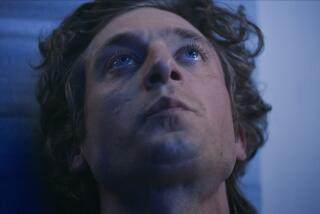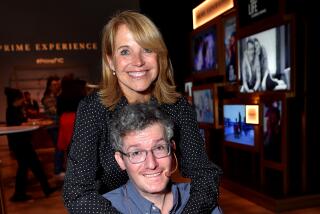There’s More to ‘Life’ Than Ratings
- Share via
“Life Goes On” is an ABC series about a family with a teen-ager named Corky who has Down’s syndrome. When word got around that it might not be back next season because of low ratings, a call came in from one of its most ardent supporters.
My brother, Terry.
“The show’s such a lifeline,” he said on the phone. There was urgency in his voice.
Airing at 7 p.m. Sundays opposite prime-time’s No. 1 series, “60 Minutes,” on CBS, “Life Goes On” may not be your preference. It’s not mine. What makes it unique, however, is that Corky is played by Chris Burke, a 26-year-old actor who has Down’s syndrome, a genetic disorder causing various degrees of mental retardation.
Except for news programs, “Life Goes On” is virtually the only television Terry watches. An absent-minded professorial type when it comes to many things, he is virtually encyclopedic about this series. My 36-year-old attorney brother, whose brain is otherwise churning with complicated legal matters, has evolved into a walking, gushing compendium of Chris Burkeisms.
Terry quotes him regularly, the way someone else might quote the Scriptures, and seems almost to have memorized his autobiography: “He doesn’t call it Down’s syndrome, he calls it Up syndrome. And he’s wanted to have a TV show since he’s little. And he says his parents have taken care of him for a long time, so now he wants to take care of them. Isn’t that something?”
Yes, it is. And so is television that touches someone in such an intimate way. “Intimate is an understatement,” Terry said.
It’s not by accident that “Life Goes On” has woven itself into the lives of Terry and his wife, Holly. They have a 1-year-old daughter. Her name is Danielle. She’s an adorable kid. And she has Down’s syndrome.
For Terry and Holly, watching “Life Goes On” is not only an inspiration, it’s also like going to school. “I’ve learned so much from that show,” Terry said. “It shows someone with Down’s syndrome going through all the problems of life that a lot of people go through. It shows people attacking those problems and resolving them as opposed to giving up.
“Homework is hard for Corky. Everything is hard for him. I can still visualize one segment when Corky was being made fun of by some tough kids in school. They were throwing around his homework, and there was this slow-motion shot where all the papers were strewn in the wind. Corky had a painful expression on his face, but you know what he did?” Terry paused for emphasis, and I could picture the awe on my brother’s face. “He just picked up his papers, one by one, put them in his notebook and went on with his life.”
Burke is a real charmer who has received a lot of publicity. Just the other night he was on the Arsenio Hall show with Andrea Friedman, a knockout young actress who has Down’s syndrome who was introduced last month as Corky’s girlfriend on the series. Moreover, lots of articles have been written about the show’s profound impact on Down’s syndrome kids and their families.
But that is an abstraction unless you’ve experienced the impact yourself. “We’re saving some episodes of the show so that we can show Danielle when she grows up,” Terry said. “There are not a lot of role models that show people with disabilities accomplishing things. Until I had Danielle, I never appreciated the importance of that.”
Nor, prior to “Life Goes On,” whose executive producer/creator is Michael Braverman, were there any national role models for parents of Down’s syndrome children. “The show provides you with the strength to have great expectations for your child,” Terry said.
He and Holly were ecstatic upon learning of plans for a “Life Goes On” episode about Corky dating Amanda, the character with Down’s syndrome played by Friedman. In that episode, Corky and Amanda went on a date and kissed, and if the series continues in the fall, they may get married.
“We were waiting and waiting for that show,” Terry said. “We wondered what she would look like and how she would carry herself. When we saw her, we looked at each other and literally sighed because we saw our daughter.”
Terry conceded that the episode’s ending was maudlin and more than a bit saccharine. He’s a tough critic. “But for this show, I didn’t mind it,” he said.
For fall, ABC has already publicly committed the time slot now occupied by “Life Goes On” to a news magazine series, meaning that if the incumbent program does somehow survive, it will have to be moved. ABC is expected to announce its fate next month. And if it doesn’t survive? “It makes me sad to think about it,” Terry said.
On the positive side, in giving this pioneering series three years of life, ABC has granted Chris Burke an influential platform on which to educate the ignorant and to demonstrate the capabilities of someone with an oft-misunderstood disability.
“Isn’t it ironic,” I asked my brother, “that you with your college degrees galore would so admire someone with Down’s syndrome?”
“Not at all,” he replied. “Someone who has to try hard to be average is someone I consider to be a hero.”
More to Read
The complete guide to home viewing
Get Screen Gab for everything about the TV shows and streaming movies everyone’s talking about.
You may occasionally receive promotional content from the Los Angeles Times.






